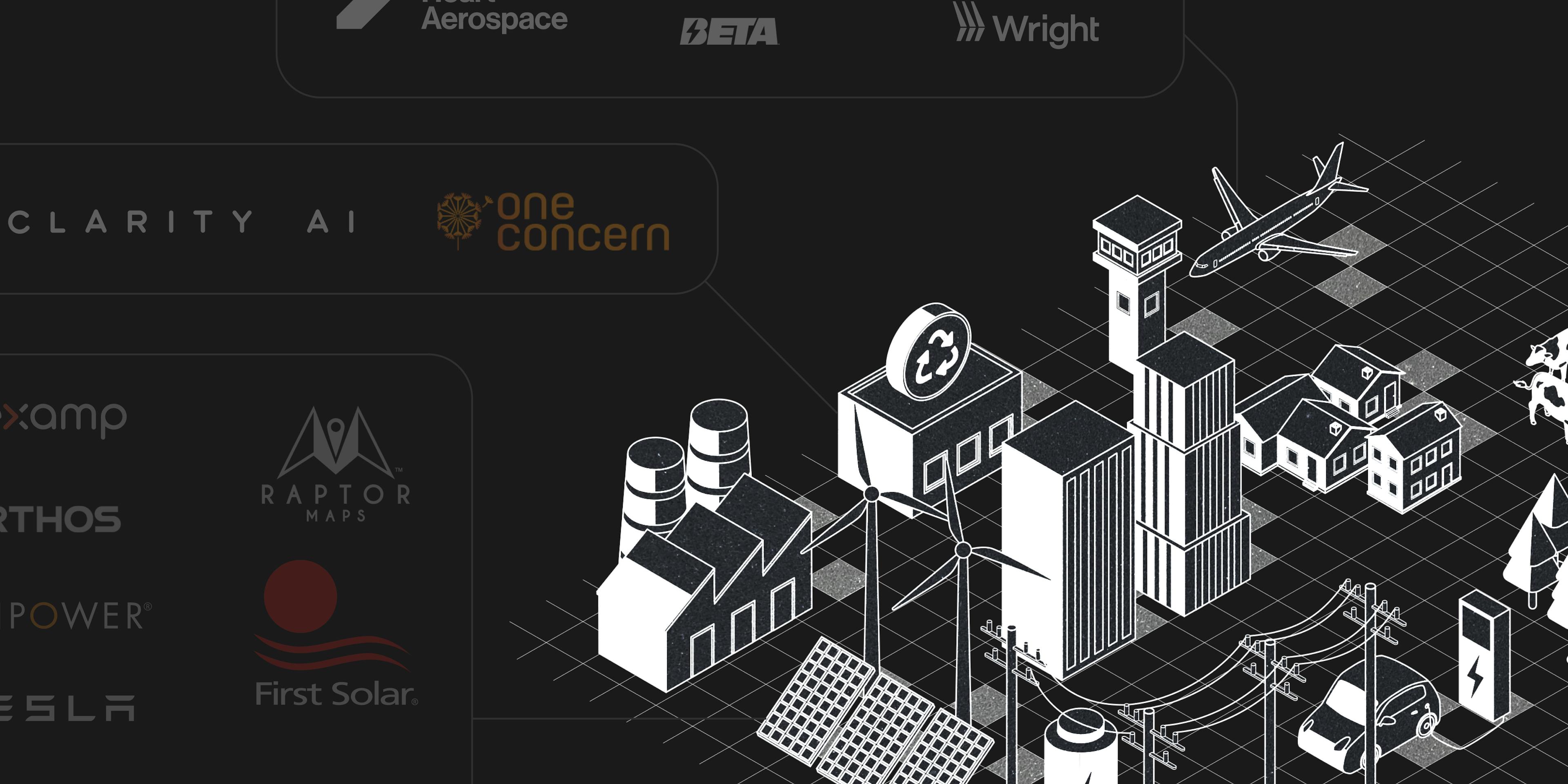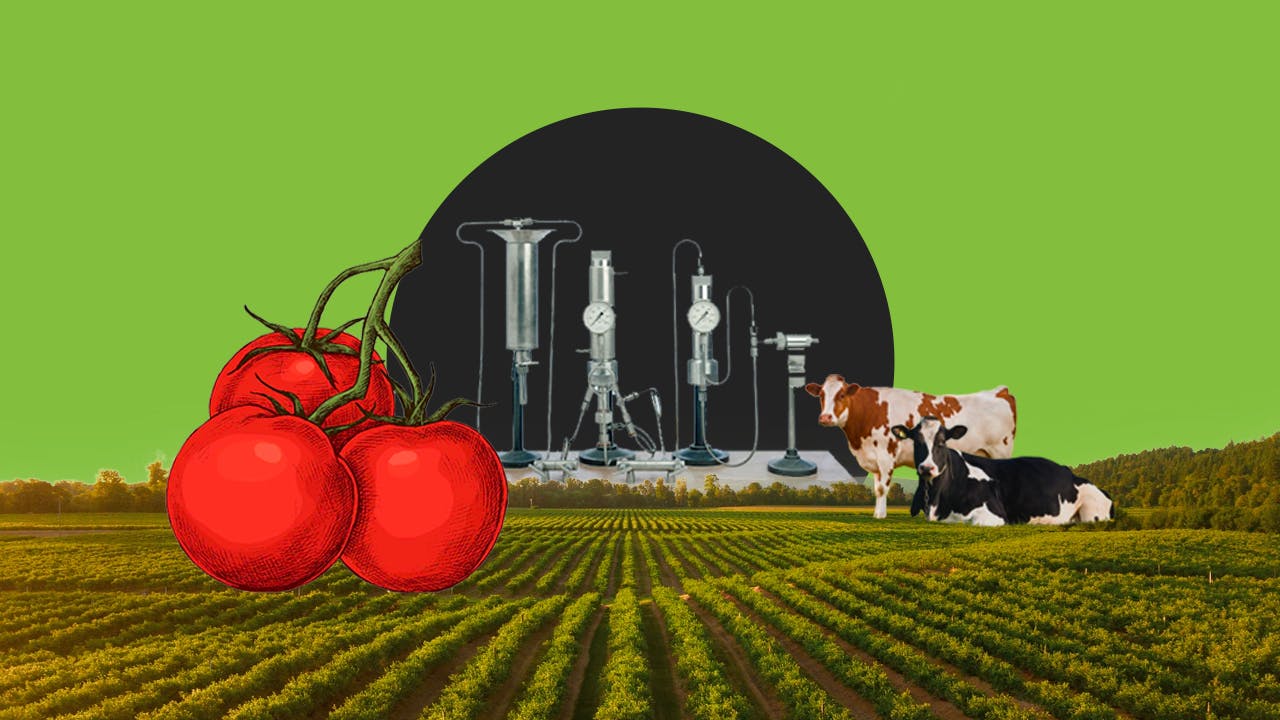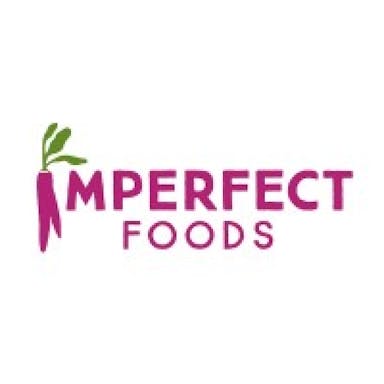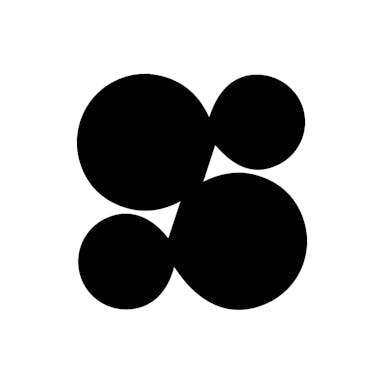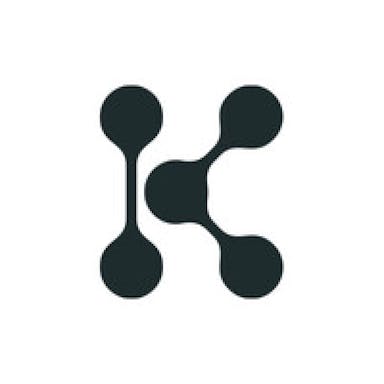Thesis
Hunger is on the rise in the United States. In 2023, 26.5 million Americans reported not having enough to eat, up from 24.5 million in 2022. National food programs implemented and expanded during the COVID-19 pandemic have ended, and food prices are up 6.7% in 2023. Further, food production accounts for 26% of global greenhouse gas emissions, with half of the world’s habitable land used for agriculture. One potential solution to both growing food insecurity and the environmental impacts of food systems in controlled environment agriculture.
Controlled environment agriculture (CEA) is a method of boosting food production to meet rising global demand as climate change creates hostile growing conditions. Vertical farming differs from traditional farming by stacking crops vertically and using artificial lighting and water feed systems, leading to more efficient water and land use than other farming methods. Vertical farming has the potential to minimize emissions, while the ability to locate vertical farms close to urban consumers increases the freshness of produce since it won’t need to travel vast distances to reach urban consumers.
Bowery Farming is a vertical farming company that uses vertical stacking in controlled environments and artificial intelligence (AI) to optimize inputs and improve yields. The company claims it can grow 100x more food per acre than traditional farming while limiting pesticide use and requiring 95% less water. Bowery Farming has become a leader in the space, with products in nearly 1.9K stores as of July 2023.
Founding Story
Bowery Farming was founded in 2015 by Irving Fain (CEO), David Golden (strategic finance and business operations), and Brian Falther (systems engineering). Irving had the initial idea for Bowery Farming and brought on experienced entrepreneurs Golden and Falther as Co-Founders.
Fain grew up in Providence, Rhode Island, and noted that being part of the smallest state gave him unique access to fresh food since he was close in proximity to local farms. He explained that his upbringing in Providence combined with his mother’s emphasis on the importance of food quality planted the seeds of interest for the problems that he would tackle at Bowery Farming.
Before founding Bowery Farming, Fain spent five years directing digital marketing at iHeartMedia before co-founding CrowdTwist, a loyalty analytics firm, in 2009. Fain remained as CEO of CrowdTwist until 2014, and the company was acquired by Oracle in 2019.
Fain believed that technology had a unique ability to solve the world’s difficult and important problems. He noted that this belief was what ultimately led him to start Bowery. After joining forces with Golden and Falther, the trio identified that “food and agriculture sit at the nexus of so many global issues that we face today and will challenge us for the next 50+ years.” Further, the team cited that the global population is set to reach 9-10 billion people by 2050, meaning food production will have to increase by 70% to feed the growing population.
In 2023, Fain and Golden remain in their roles at Bowery Farming. Falther left his role in 2020 to pursue new entrepreneurial endeavors. Other management roles point to Bowery Farmings’ focus on technology. The Chief Science Officer, Henry Sztul, joined in 2015 and was previously a software engineer manager at Samsung. In 2020, Colin Nelson was brought on as an EVP and Chief Supply Chain Officer. In 2021, Injong Rhee became Bowery’s Chief Technology Officer (CTO), bringing three years of IoT experience from Google. In March 2023, Matt Williams joined the Bowery’s Team as the Chief Sales Officer.
Product
Bowery Farming’s hydroponic vertical farming system grows plants by suspending their roots in nutrient-rich water. The water is filtered, purified, and has nutrients managed by the system’s operating system, BoweryOS. The carefully mixed water contains nitrogen, phosphorus, and calcium to optimize plant health. BoweryOS also manages how all plants receive light via energy-efficient LED lights lining the indoor farms.
Produce
Most vertical farming companies initially focus on herbs and leafy greens due to these being the most economically viable to grow. Leafy greens sell at high prices, grow quickly, and are less resource-intensive than grains or fruit. Bowery Farming’s produce includes lettuces, mixes, dark leafy greens, herbs, and berries.
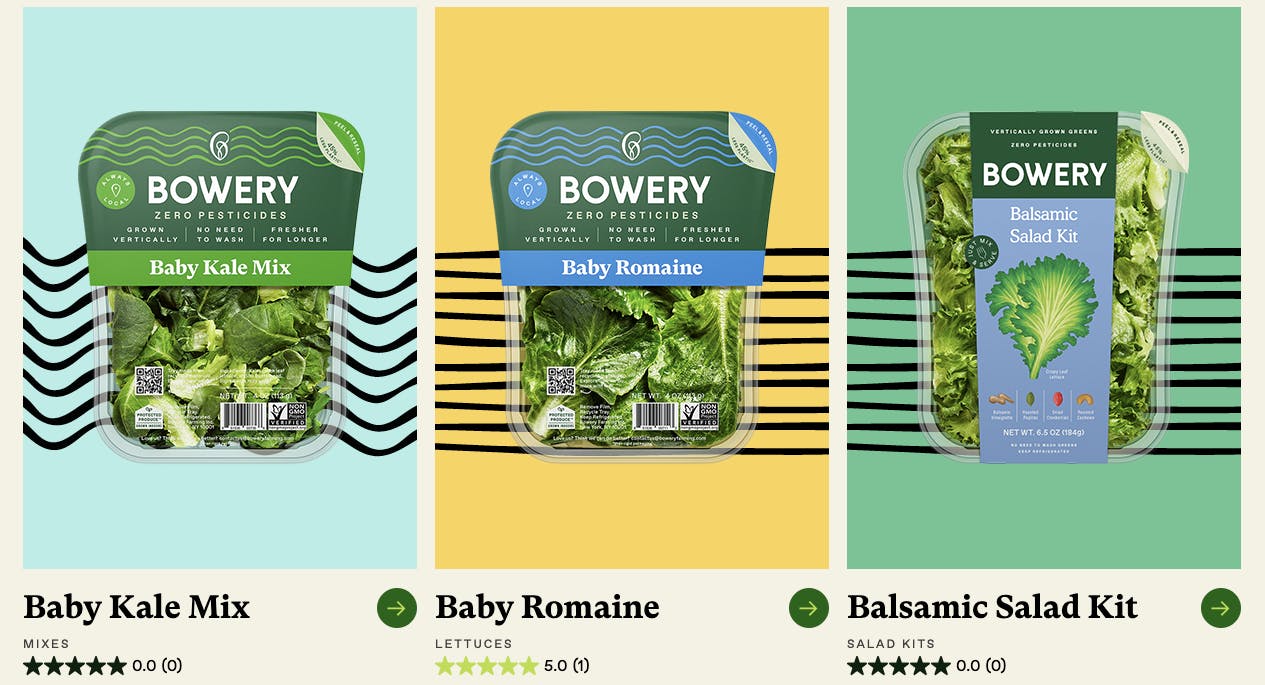
Source: Bowery Farming
Bowery Farming can grow fresh produce in metropolitan areas with less land and water and without pests, weather, and climate concerns. Although it only produces leafy greens and berries, with automation advancements and optimized efficiency, Bowery Farming should be able to expand its offerings.
Ready-to-Eat Salad Kits
In 2022, Bowery Farming expanded its product line into the ready-to-eat category. The company introduced three flavors of salad kits that feature forkable greens, flavoring, and toppings. The three varieties available are Zesty Caesar, Avocado Ranch, and Balsamic Vinaigrette. These salad kits will be available via distributors including Baldor Specialty Foods and Four Seasons, and retailers including Wakefern and Giant Stores.
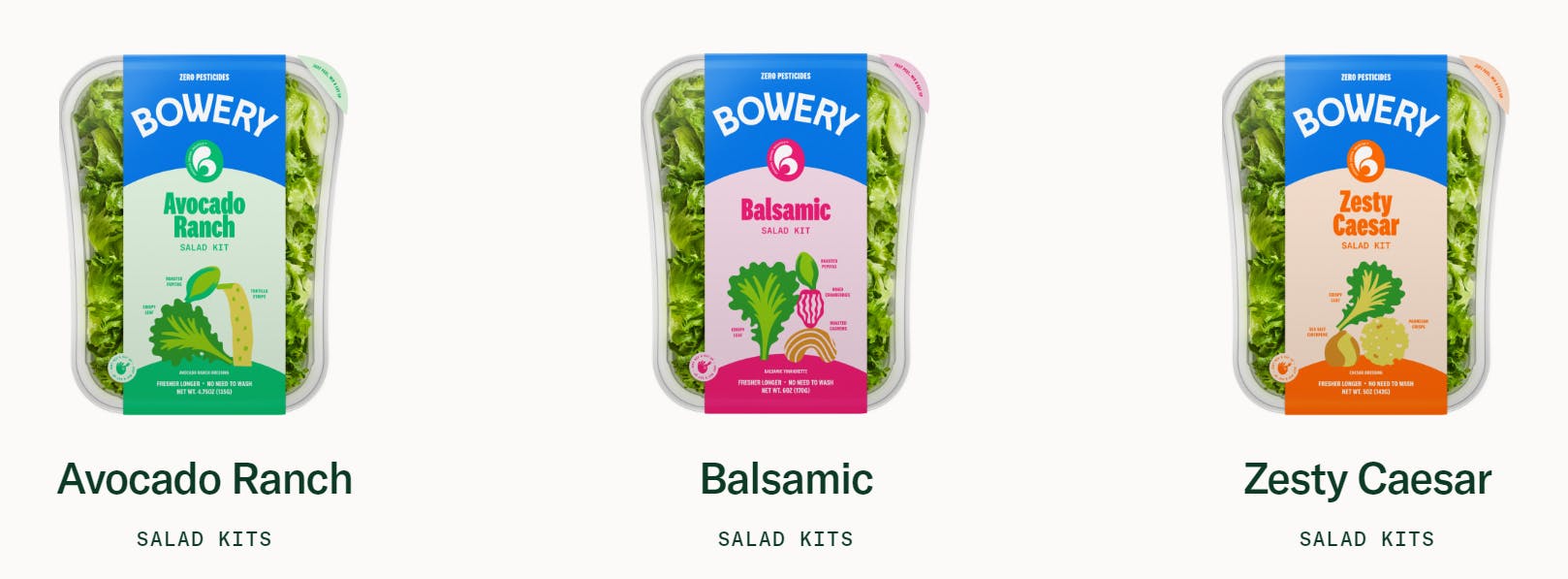
Source: Bowery Farming
BoweryOS
The brain behind Bowery Farming is its proprietary farm operating system, BoweryOS. BoweryOS uses AI to create a smart farm capable of maximizing space by vertically stacking crops. Overall, BoweryOS enables end-users to utilize AI to improve crop yield by tracking and controlling every aspect of the process from propagation, growing, harvesting, and packaging. The operating system integrates all growing hardware including sensors, vision systems, automation, and robotics to control the growing process. BoweryOS is considered the key to the Bowery Farming kingdom.
According to Bowery Farming, the system increases yields by 100x compared to traditional farms on the same acreage. Using hydroponics, LEDs, and controlled air conditions, BoweryOS provides farmers with advanced tools. It provides a view into the well-being of plants while automatically nurturing crops on an as-needed basis.
Within Bowery Farming’s vertical farms, every crop grows without soil and within an individualized climate. Sensors and cameras collect data about produce health to optimize their growing climates. Its closed-loop system circulates purified water to oxygenate plants and significantly reduces water consumption.
When a crop is facing issues, the system automatically updates its environment. When crops reach their optimal flavor and quality, BoweryOS alerts farmers to pick at peak freshness. Due to its indoor nature, the company’s farms operate with zero pesticides, traceable crops, year-round production, fewer natural resources, and fewer miles for delivery.
Market
Customer
Bowery Farming primarily targets distributors, ecommerce platforms, and grocery stores in a business-to-business-to-consumer model. As of September 2023, the company does not sell its produce directly to consumers. The company’s produce was carried in nearly 1.9K stores as of July 2023. Notable customers of Bowery Farming include Amazon, Whole Foods, Walmart, Ahold Delhaize, Safeway/Albertsons, and Stop & Shop.
Bowery Farming also partners with distributors including Baldor Specialty Foods and Four Seasons. From 2020 to 2023, the company has increased its retail footprint by over 15x through partnerships. In July 2023, Bowery Farming strengthened its existing partnership with Amazon to Amazon Fresh. This partnership enables consumers on the East Coast of the United States to order Bowery Farming’s produce for delivery.
Market Size
The global crop production market size is projected to reach $5.8 trillion in 2023, growing at a CAGR of 9.9% through 2027 to nearly $8.5 trillion. Bowery Farming targets the vertical farming subset of crop production. The global market for vertical farming was valued at nearly $5.9 billion in 2022, projected to grow at a CAGR of 20.1% through 2030 to nearly $25 billion. Further, by 2025, CEA is projected to support 10% of US vegetable and herb production. The primary driver for this industry’s growth is technological innovation to support the growth of leafy greens, berries, and in the future, other fruit and vegetable crops.
Competition
Plenty: Founded in 2014, Plenty is a vertical farming company based in San Francisco, CA. Like Bowery Farming, Plenty offers indoor-grown, pesticide-free produce primarily sold through partnerships with grocery stores. In January 2022, Plenty announced that it had raised a $400 million Series E at an undisclosed valuation led by One Madison Group and JS Capital. Walmart, Plenty’s largest strategic partner, also participated in the round. This Series E brought the company’s total funding to approximately $941 million. The company has not disclosed how many national retail locations its produce is available in, however, as of August 2023, Plenty’s produce was available in over 180 California locations.
AeroFarms: AeroFarms is a vertical farming business founded in 2004, based in Newark, New Jersey. Like Bowery Farming, the company specializes in vertically-grown, pesticide-free leafy green produce. Additionally, AeroFarms utilizes a business-to-business-to-consumer model, with customers including Whole Foods, Stop and Shop, and Walmart. In July 2019, the company announced that it raised $100 million in funding led by Patient Capital. In February 2023, Aerofarms announced that it was expanding to Abu Dhabi, UAE with the support of Abu Dhabi Investment Office. In total, the company has raised $238 million of disclosed capital.
Gotham Greens: Founded in 2009, Gotham Greens develops urban farms primarily in greenhouses. Like Bowery Farming, Gotham Greens specializes in the production of leafy green produce and partners with local grocery stores. Unlike Bowery, Gotham Green’s greenhouses rely on sunlight, reducing total energy costs. In September 2022, the company announced that it had raised $310 million in Series E funding led by BMO Impact Investment Fund and Ares Management at an undisclosed valuation. This funding brings the company’s total funding to $440 million since launch. The Series E is intended to allow Gotham Greens to expand its greenhouses nationwide.
Crop One: Crop One is a technology-driven vertical farming company founded in 2012 based in Boston, MA. Like Bowery Farming, Crop One specializes in the production of vertically-grown leafy greens. Crop One is a holding company with brands including FreshBox Farms. In 2021, the company announced a five-year growth plan with the goal of opening one large farming facility per year through 2026. As part of this growth plan, the company opened the “world’s largest vertical farm” in Dubai in 2022. In total, Crop One has raised $56.3 million in funding, including a mix of debt financing, grants, and venture funding.
Oishii: Oishii is a vertical farm specializing in the production of strawberries. Founded in 2017, the company is based in Kearny, New Jersey. Unlike other vertical farms, Oishii does not produce leafy greens and instead focuses on berries, namely strawberries. Currently, Oishii partners with grocery stores in New York, New Jersey, Connecticut, and D.C., including Whole Foods. In March 2021, Oishii raised a $50 million Series A led by SPARX Group’s Mirai Creation Fund II, bringing its total funding to $55 million. The company has not disclosed plans to expand to crops other than strawberries.
Business Model
Bowery Farming has not released its financials from 2014 to 2023 and does not disclose if it is profitable. A 4-ounce container of Bowery Farming lettuce sold retail for $3.69 for 4 ounces ($14.76/lb) in June 2023. Retailer margins of 40-50% mean Bowery Farming likely sold wholesale at ~$9/lb. In comparison, conventional lettuce costs ~$3-4.
Capital Expenditures
Building a vertical farm is expensive. It requires layers of racks, water and nutrition systems, lights, and potentially robots. In 2020, Bowery Farming’s Bethlehem Pennsylvania facility cost over $30 million for 150K square feet ($200/foot). A potential new facility in Texas could cost $51 million for 159K square feet ($319/square foot). The company eases construction costs by outfitting abandoned warehouses and always looks for ways to improve construction methods.
Labor
An analysis of AeroFarm’s vertical farms compared to controlled greenhouses suggests vertical farm labor accounts for a fourth to third of costs. Bowery Farming seeks to reduce labor costs by automating processes. The company uses AI and harvesting robots for plant health measurements.
Electricity
Replacing sunlight with light racks creates high electricity costs. Electricity costs can be 10x per square foot compared to greenhouses. The cost of electricity could be even more than 10x, depending on the number of layers of the vertical farm. Electricity prices affect vertical farm margins by double digits. While standard solutions such as LEDs are more efficient than alternatives, vertical farms are still highly dependent on energy. Vertical farms must continue developing innovative ways to reduce electricity costs.
Traction
As of July 2023, Bowery Farming products were carried in almost 1.9K stores including Whole Foods, Ahold Delhaize, Amazon, Safeway/Albertsons, and Walmart. Bowery Farming increased its retail distribution by 40% in 2022. The company’s presence in mainstream grocers has helped grow its grocery sales by 750% since January 2020 and the company has plans to open two more facilities in 2023.
Bowery Farming operates three farms in the Mid-Atlantic region of the US. If the company continues to grow, it has plans to expand into the southern US Arlington, TX, and Locus Grove, GA). With the launch of its third farm, it can produce 47 million servings of leafy greens. Bowery Farming still has significant room to sell more leafy greens to US consumers via expanded strategic partnerships.
Valuation
In May 2021, Bowery Farming raised a $300 million Series C led by Fidelity Management & Research Company LLC. This funding round valued Bowery at a post-money valuation of $2.3 billion. In January 2022, the company complemented this fundraise with a $150 million credit facility managed by KKR. In total, Bowery has raised approximately $626 million in disclosed funding as a combination of venture funding and debt financing. As of Bowery’s latest funding rounds, the company has not disclosed any plans to go public.
Key Opportunities
Product Line Expansion
As of July 2023, Bowery Farming offers 12 products ranging from spring salad mix to wild strawberries. It has slowly added new products to its product lines, expanding from the initial offering of leafy greens. Horizontal expansion presents a growth opportunity for Bowery Farming. It can offer vegetables like tomatoes and bell peppers and more fruits like blackberries and blueberries.
Some hydroponic companies have even incorporated fish tanks in their waterways to create self-sustaining ecosystems with fresh fish and produce. Vertical farming is not conducive to root vegetables (turnips, carrots, potatoes), so the company is not likely to grow them. Due to the high prices of berries compared to veggies, Bowery Farming could continue to expand its fruit selection.
BoweryOS Licensing
Bowery Farming doesn’t strictly need to open more physical farms to produce revenue. The company can offer AI applications for modern hydroponic systems. Selling its software to large-scale farms could establish partnerships while keeping the company light on assets. Physical farms are expensive to build, and selling software licenses could allow the company to open an additional revenue stream without becoming heavier on assets.
Strategic Partnership Expansion
Bowery Farming’s produce is available in nearly 1.9K grocery stores. Notable stores include Walmart, Whole Foods, Stop & Shop, and e-commerce platforms like Amazon Fresh. Hydroponics crops are local and distributed locally to maintain freshness. In the US, each region is served by a set of Hydroponic farms. Plenty, for example, is Whole Foods’s west-coast hydroponics source, and the Midwest can buy AppHarvest’s hydroponic tomatoes.
Bowery Farming’s production can compete with other hydroponic farms. Expansion into new retail locations with new strategic partnerships would enable it to sell in more locations and compete against competitors in new geographic markets. Global hydroponic crop production is higher than the fresh produce grown in the US. Countries facing food insecurity are future targets for hydroponics. Bowery Farming has an opportunity to build farms to serve markets outside of the US like the UK, Australia, and the Middle East. For example, both Crop One and AeroFarms have expanded operations to Dubai and Abu Dhabi respectively.
Key Risks
Unit Economics
Bowery Farming’s fundamental economics work because its product offerings are not resource intensive and sell at premium prices. Reducing labor and optimizing growing conditions improves the economics, but vertical technology is getting close to its scientific limitations. Vertical farming needs innovations in automation, energy, and seed technologies to improve yields. Without further breakthroughs, Bowery Farming’s profitable operations are limited to premium portions of the produce market.
Commoditization
Most big CEA companies in the US sell the same leafy green products as conventional farms. Pricing competition is fierce, limiting points of differentiation. While AI can help improve yields, the science of growing commodity products is researched enough that the difference between vertical farming AI is limited. A former AeroFarms executive explained the company was researching making super sweet tomatoes, super cannabis, and vaccine bean plants as a long-term strategy to achieve profitability. Bowery Farming has not publicly disclosed intentions to research similar product innovations.
Cash Flow Expenses
Building a vertical farm is more expensive than using the same amount of land for traditional farming. However, vertical farms produce higher yields, produce year-round, and use inputs such as water and fertilizer more efficiently. In January 2022, Bowery Farming filed to build a 159K-square-foot indoor farm in Arlington, TX. It estimated the farm to cost $50.8 million and be capable of producing $144 million in annual revenue.The upfront costs of vertical farms make nationwide expansion expensive for Bowery Farming. With global economic uncertainty, the company faces a challenging funding environment, given its use of debt to help finance expansion.
Summary
Bowery Farming was the largest vertical farming company in the United States as of 2021. Its AI system is helping it increase crop yields and land efficiency. Vertical farming is likely to gain traction as climate change brings more attention to land use and increases risks for traditional agriculture. The company’s upfront capital needs are higher than traditional farms. Building additional farms to serve new markets requires tens of millions in up-front capital expenditures. The investment costs serve as a barrier to entry for new competitors.
Bowery Farming uses its proprietary operating system, BoweryOS, to increase yields. The company has relationships with major grocers and plans to expand into metropolitan areas like Dallas and Atlanta. It can leverage its position to improve its economics and deepen its moat against competitors. Bowery Farming will likely look to increase its lead in the vertical farming industry and continue expanding its business via new product offerings, expanded strategic partnerships, and expansion to new geographic markets.

